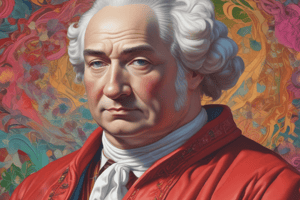Podcast
Questions and Answers
What did David Hume famously argue about regulating actions?
What did David Hume famously argue about regulating actions?
- Faith should be used to regulate actions
- Reason should be used to regulate actions (correct)
- Emotions should be used to regulate actions
- Intuition should be used to regulate actions
In ethics, what did David Hume believe had dominion over feelings or emotions?
In ethics, what did David Hume believe had dominion over feelings or emotions?
- Instinct
- Intuition
- Reason (correct)
- Faith
Which field did David Hume NOT engage in?
Which field did David Hume NOT engage in?
- Essay Writing
- Mathematics (correct)
- History
- Economics
What was one of David Hume's primary contributions to ethics?
What was one of David Hume's primary contributions to ethics?
What was one of the key reasons David Hume placed himself in opposition to most moral philosophers?
What was one of the key reasons David Hume placed himself in opposition to most moral philosophers?
What do philosophers often debate regarding emotions?
What do philosophers often debate regarding emotions?
How are emotions related to beliefs and desires according to the text?
How are emotions related to beliefs and desires according to the text?
What is the role of emotions in shaping human behavior according to the text?
What is the role of emotions in shaping human behavior according to the text?
Which branch of philosophy explores the nature of the mind and its connection with the body?
Which branch of philosophy explores the nature of the mind and its connection with the body?
What has been a major focus of study in various branches of philosophy?
What has been a major focus of study in various branches of philosophy?
What are emotions closely intertwined with?
What are emotions closely intertwined with?
What is one of the central debates in the philosophy of mind regarding mental content?
What is one of the central debates in the philosophy of mind regarding mental content?
How do some ethicists view the role of emotions in moral decision-making?
How do some ethicists view the role of emotions in moral decision-making?
What is a key point made by existentialist philosophers about emotions?
What is a key point made by existentialist philosophers about emotions?
How do some social and political philosophers view the impact of emotions on social progress?
How do some social and political philosophers view the impact of emotions on social progress?
In ethics, what do some argue about emotions in relation to moral values?
In ethics, what do some argue about emotions in relation to moral values?
How do some philosophers describe the nature of mental content in relation to individual experiences?
How do some philosophers describe the nature of mental content in relation to individual experiences?
Study Notes
Avid Hume and Moral Philosophy
- Avid Hume (1711-1776) opposed most moral philosophers, arguing that reason should regulate actions and dominate emotions.
Emotions in Philosophy
- Emotions are a major focus of study in philosophy, particularly in the philosophy of mind, ethics, and social and political philosophy.
- Emotions are closely tied to mental states and the functioning of the mind.
Emotions in Ethics
- Emotions play a crucial role in moral decision-making, with some ethicists arguing they are essential and others that they can be a hindrance.
- Emotions help us understand and respond to the needs and interests of others, but can also cloud our judgment and lead to decisions based on fear or anger.
Emotions in Social and Political Philosophy
- Emotions shape our social and political institutions and influence our social and political values.
- Some philosophers argue that emotions help us understand and respond to the needs and interests of others, while others argue they can prevent progress towards a more just and equitable society.
Emotions in Existentialist Philosophy
- Emotions are an essential part of human experience and are closely tied to our sense of freedom and responsibility.
- Existentialist philosophers such as Jean-Paul Sartre and Martin Heidegger argue that emotions are a way of engaging with the world and making choices.
Emotions and Mental States
- Emotions are complex mental states associated with feelings, thoughts, and bodily sensations.
- Emotions are part of our subjective experiences and shape our behavior, thoughts, and interpersonal relationships.
- Philosophers debate the nature of emotions and their relationship with other mental states, such as beliefs, desires, and intentions.
Emotions in Philosophy of Mind
- The philosophy of mind deals with the nature of the mind and its relationship with the body.
- Emotions are a central topic in the philosophy of mind, with debates surrounding the nature of mental content and the role of emotions in mental states.
Studying That Suits You
Use AI to generate personalized quizzes and flashcards to suit your learning preferences.
Description
Learn about philosopher David Hume's ethical theses which focus on regulating actions with reason and prioritizing reason over emotions. Explore his ideas that have influenced moral philosophy.





